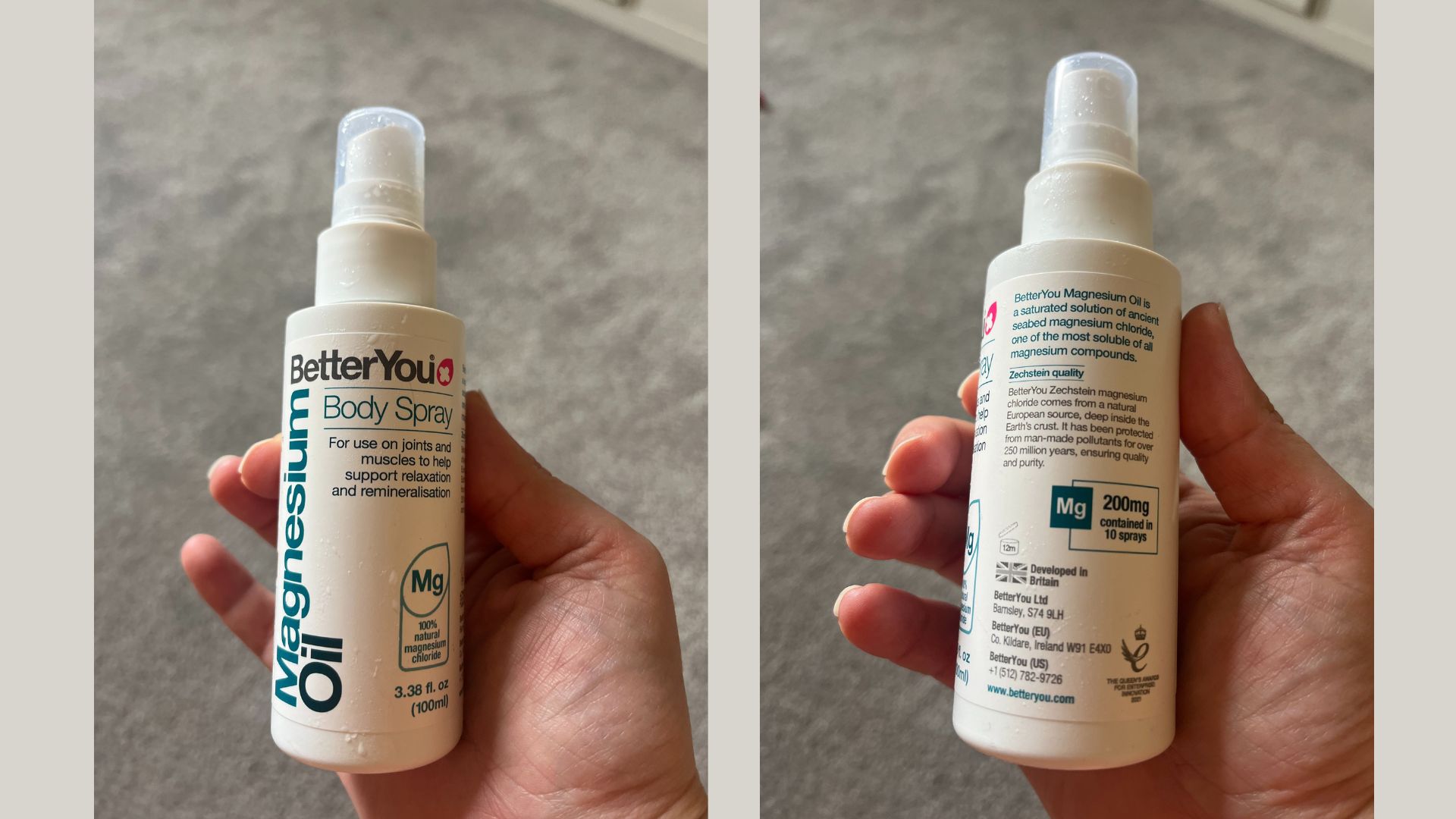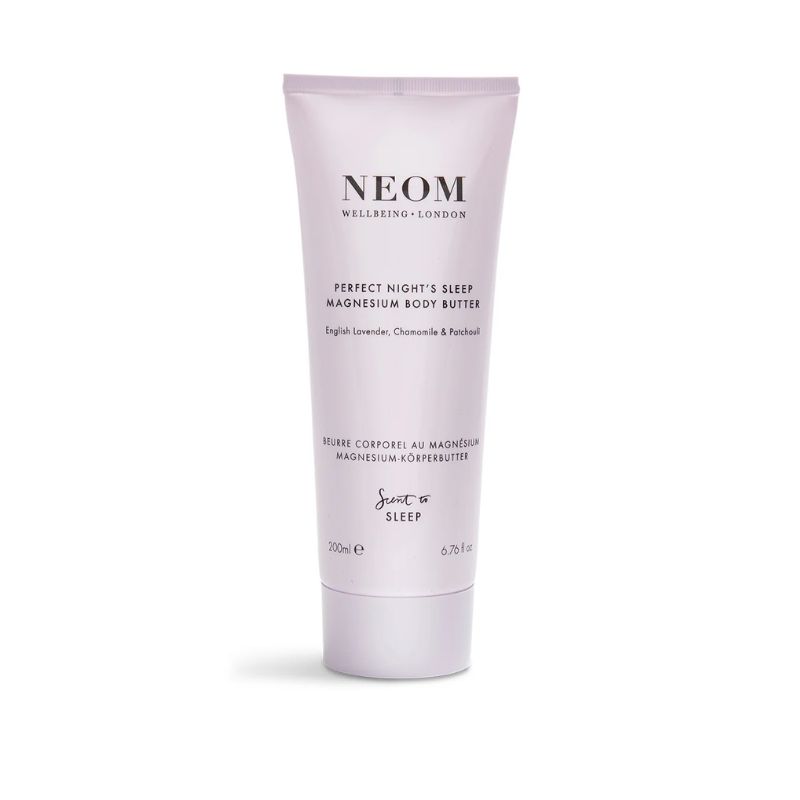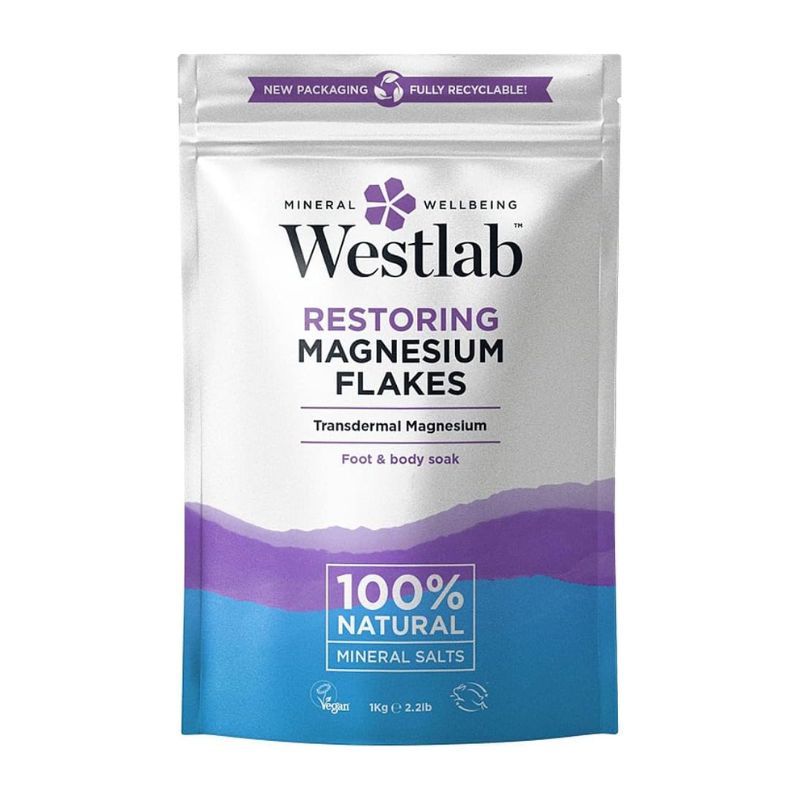I tried putting magnesium oil on my feet for better sleep - here's what happened after just three nights
Writer Kat Storr has always struggled with sleep - until she started putting magnesium oil on her feet before bed. These benefits she found in just a few days

After years of sleep issues and dealing with restless legs syndrome, I'm used to feeling tired and foggy after a bad night's sleep. If you'd told me a month ago that I'd be sleeping soundly through the night with just one change in my nightly routine, I wouldn't have believed you.
I've tried all the methods to try and learn how to sleep better - from going to bed earlier and removing my phone from the room to using pillow sprays and playing brown noise through my headphones. While some of these worked in the short term, none could be relied on to help me get a good night’s sleep - until I tried magnesium oil.
I first heard about using magnesium oil on my feet through my massage therapist, who said she was using it at night to help her sleep. I'd never even heard of it before and although it initially sounded bizarre to me, as soon as I started looking at the benefits of magnesium, I knew I had to give it a go.
Benefits of magnesium oil on feet
1. Better sleep
The main benefit of using magnesium oil on feet is to help improve sleep. As Niki Woods, a qualified nutritionist and menopause expert, says: "Around 39 to 60% of women in perimenopause and post-menopause suffer from sleep disturbances and many women find magnesium helps them with sleep."
Sleep disturbances could include insomnia, night sweats, waking up in the night or early waking.
All of the experts I spoke to said putting magnesium oil on the soles of your feet can help your body maintain its circadian rhythm (the body’s natural 24-hour cycle) and improve the quality of your sleep. There's also research linked to institutions such as the University of Cardiff and published in the Journal for Neutraceutical Research to suggest that magnesium absorption begins immediately when applied to the skin, as opposed to a few hours later as with tablets, which may explain why this is.
Admittedly, this wasn't a benefit I saw immediately. For the first few days, my feet felt quite itchy and tingly - a sign of low magnesium levels. I knew I needed to be using the oil or supplementing in some way but it was quite uncomfortable, having the opposite intended effect as I was quite fidgety.
Sign up for the woman&home newsletter
Sign up to our free daily email for the latest royal and entertainment news, interesting opinion, expert advice on styling and beauty trends, and no-nonsense guides to the health and wellness questions you want answered.
However, after three days this itchiness had stopped. One morning I woke up feeling so well-rested that I realised the oil must have worked. My restless legs had stopped and I’d gone straight to sleep. Some nights I can lie awake, tossing and turning for over an hour after I’ve turned out the light. But the nights after I started using the oil I went straight into a deep sleep. No more lying awake listening to the foxes on the street outside or my husband snoring.
For a product that is inexpensive and very easy to apply, this feels like a game-changer for women like me experiencing sleeping issues.
Niki Woods is a qualified nutritionist, a personal coach who specialises in working with women in midlife, and a midlife wellbeing and menopause consultant working directly with businesses. A member of the British Menopause Society and International Menopause Society, with qualifications in human resources, nutrition, and personal training, Niki takes an integrative approach to improving women’s health, fitness, mindset and habits in midlife, and supporting them to understand and manage their menopause transition.
2. Restless leg syndrome
Restless legs syndrome is a frustrating sleep issue for many women, characterised by an overwhelming urge to move your legs and feet. For many people, including myself, it's worse at night. I’ve suffered from restless legs for years but I’ve never really investigated any treatments for it. I just thought it would either go away on its own, or I’d have to accept it as part of my life.
It’s thought magnesium oil can help reduce the symptoms of restless legs by calming your nervous system down, especially as your dopamine levels drop as night time approaches.
The magnesium oil - after the initial itchy phase - helped hugely. I’m not sure whether it was the fact I was going to sleep faster so there was no time for restless legs - or no restless legs so therefore I could get to sleep better. Either way, it was a huge positive.

BetterYou's magnesium oil was the product of choice for Kat Storr, who used it every night for two weeks.
3. Joint pain
Magnesium has been shown to help with the absorption of calcium in the body and aid normal muscle function. If you have any aches or pains, magnesium oils and sprays can be one way to help ease the discomfort.
Sprays and gels with magnesium and glucosamine - a natural compound found in cartilage and artificially made from shellfish in many cases - are particularly useful for this when it's applied directly to the muscles.
4. Anxiety and depression
While there's no match for proper professional help when it comes to handling a mental health issue, some people find that magnesium can help ease feelings of anxiety as it's been shown to lower cortisol levels - the hormone linked to stress.
Nutritionist Thalia Pellegrini also points to other studies by the University of Pittsburgh and the University of Vermont which show that menopausal women with higher levels of magnesium "reported less severe depression", she says. "However, the dose required is best achieved with oral supplementation."

Thalia Pellegrini is a registered nutritional therapist. She specialises in women's health with a focus on perimenopause and menopause. Known as the Knackered Mums' Nutritionist she runs her signature group online programs The Energised Mum Method and her 28-day weight-loss program The Reset Method, both designed for women in perimenopause and menopause. She also works 1:1 with women in the UK, Europe and North America, to address health issues ranging from low energy, PCOS, endometriosis, PMS, perimenopause and menopause.
5. Support for bone density
Our bodies need magnesium to create new bone, increase vitamin D levels and use calcium efficiently. Woods explains: “There's some evidence it can help with bone mineral density, which is also important as our osteoporosis risk dramatically rises with menopause.”
However, there is less evidence specifically looking at magnesium oils and sprays for this benefit so it's not one to rely on. Other types of magnesium supplementation are available, notes Pellegrini. "There are powders to add to water, capsules to swallow, salts to add to a bath and oils that we can apply to our skin," she says. "The oils are a good choice for women who don't like to take supplements or find them hard to swallow though, or for women who find oral magnesium causes digestive upset,” she explains.
If in doubt, always speak to your doctor before taking on any new supplements.
Best magnesium oil for feet

£13.50 Better You's magnesium oil is the one I used for two weeks. At 31% concentration, it sits within the regular 25 to 35% range. Suitable for vegetarians and vegans, dermatologically tested, and under £15. What's not to love?

£36 | While this product is more expensive than the body oils on our list and contains more ingredients than what the experts have advised, it's another tried and tested winner for the team at woman&home and the primary ingredient is magnesium chloride.
"I love how the NEOM Perfect Night's Sleep Magnesium Body Butter smells, with the blend of lavender, chamomile, and patchouli. It absorbs very quickly into the skin and also acts as a moisturiser with the shea butter ingredient. I once slept for 12 straight hours after using this cream," says Digital Health Editor Grace Walsh.

£6.99 | If you're on more of a budget or don't fancy rubbing oil into your feet every night - but do enjoy a bath - then Westlab's magnesium flakes could be a good sleep aid for you. Add 1-4 cups to a warm - not hot - bath and relax for around 20 minutes to give the flakes a moment to work.
How to choose a magesnium oil for you
- Speak to your doctor: If you're taking any other medications, it's a good idea to speak to your doctor before putting magnesium oil on your feet. "People should check for interactions with any prescription medications, especially bisphosphonates for osteoporosis, and antibiotics," says Woods.
- Consider the type of oil: “Care needs to be taken as different forms of magnesium do different things in the body, you don’t want to be running to the bathroom when the aim is to support your sleep," says Wilma MacDonald, nutritional therapist. Magnesium chloride is best for solving sleep issues with absorption through the skin.
- Research the company: Some supplement brands are better than others, so be sure to check the company is reputable before buying and that they have the research to back up any product claims.
- Check the ingredients list: Unless there are other natural essential oils added for smell, there should be no extras in your oil. Magnesium only.
- Look at the magnesium concentration: MacDonald says 25-35% is common when it comes to magnesium oils. The Better You product I used is 31% magnesium chloride.
Wilma MacDonald is a nutritional therapist with six years experience. She also runs the Maverick Motherhood platform.
Can you leave magnesium oil on overnight?
Yes. Many women use it on their feet before they go to sleep and keep it on overnight so it doesn't get rubbed off while walking in shoes and socks. "Before bed, apply the oil to the base of your feet, stomach, arms and legs," says MacDonald. Massage it gently by patting, no rubbing."
If you find that your skin starts itching, this could be a sign of low magnesium so using a magnesium supplement may be beneficial to you. However, if it's too uncomfortable, rinse it off after 15 to 20 minutes to stop the itching while still getting some benefit, says MacDonald.
How to use magnesium oil on feet
- Apply it just like a moisturiser: Apply magnesium oil to feet and body as you would a regular body moisturiser - a thin layer, evenly spread in most cases. However, if you've been advised otherwise, always follow professional advice.
- Get your timing right: Pellegrini advises using the magnesium oil after a bath or shower when absorption will be better because your pores are open.
- Watch out for wounds: Don’t use it on any broken or cut areas of skin as this will be sore and the discomfort may mean you lose out on the benefits.
- Start with a lower dose: Pellegrini also recommends trying a small amount of the product on your skin first, to see if you have any reaction, then start with a small dose and gradually increase it as you see fit.
- Water it down if you feel itchy: Itchiness isn't necessarily a reason to stop using the magnesium oil on your feet - it can be an adjustment process. If it makes your skin itchy you can water it down before applying it.
- Stop using it if you have any negative side effects: That being said, if you have any negative side effects, then it's best to stop using the magnesium oil altogether and speak to your doctor about possible alternatives.

Kat Storr has been a digital journalist for over 15 years after starting her career at Sky News, where she covered everything from world events to royal babies and celebrity deaths. After going freelance eight years ago, she now focuses on women's health and fitness content, writing across a range of UK publications.
From perimenopause to the latest fitness trends, Kat loves researching and writing about it all. She's happy to give any fitness challenge a go and speaks to experts about wellbeing issues affecting people every day.
-
 Unforgettable date ideas to make a great first impression or rekindle romance
Unforgettable date ideas to make a great first impression or rekindle romanceForget the same old first date formula - these unforgettable date ideas will leave them thinking about you long after you go home
By Natalie Denton Published
-
 Butter yellow might be the colour of the season, but Amal Clooney is making me want to try sunshine shades
Butter yellow might be the colour of the season, but Amal Clooney is making me want to try sunshine shadesSpark some joy by adding some statement yellow pieces to your wardrobe just in time for summer
By Matilda Stanley Published